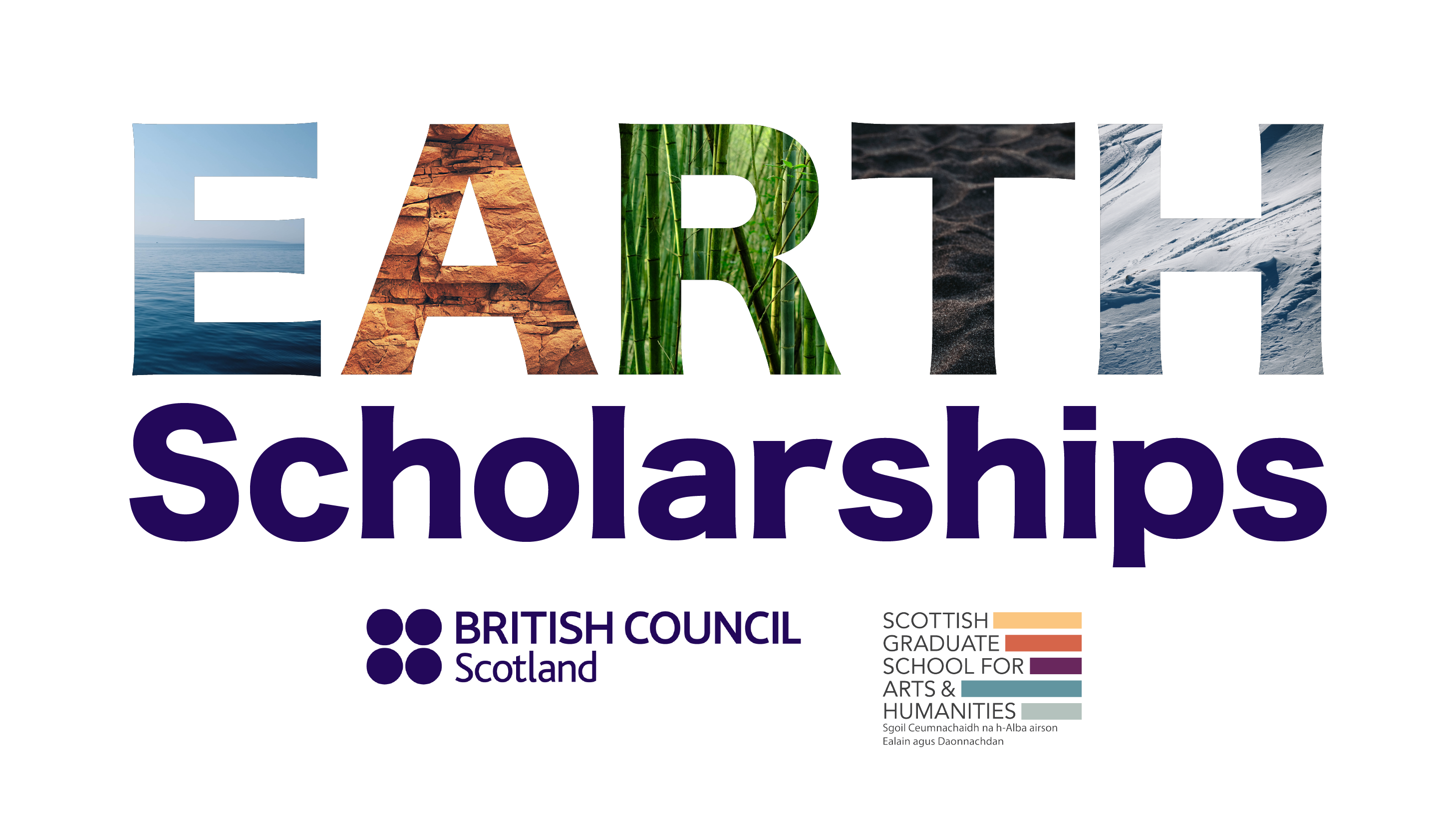Meet our 2024 EARTH Scholars

The British Council Scotland SGSAH EARTH Scholarships is a programme run by SGSAH with funding from the British Council to enable international research collaborations between PhD and Early Career Researchers and Scottish HEIs and Scotland-based academic mentors, and external organisations, thematically focused on environmental arts and humanities and their interdisciplinary connections. Our thirteen successful applicants based outside the UK will come to Scotland to undertake in-person and hybrid exchanges for up to 3 months in 2024. During a 2-week cohort programme in April, they will be joined by a group of Scotland-based scholars.
Meet the recipients of EARTH Scholarships 2024 and our Scotland-based scholars below. Click the '+' to find out more.
Krista Collier-Jarvis | Edinburgh Napier University

Krista Collier-Jarvis (Mi’kmaw; nekm/she/her) is a PhD candidate in the Department of English at Dalhousie University and an Assistant Professor in the Department of English at Mount Saint Vincent University. Her doctoral research addresses zombie narratives to develop an Indigenous-informed approach to the contagion/climate change entanglement. Her other areas of research and teaching include Gothic/horror, American lit, popular culture, and critical museology.
TransAtlantic Fluidities
The United Nations claims that water is ‘at the centre of the climate crisis.’ Yet, colonial narratives tend to relegate water to the static fringes. Krista is an Indigenous PhD researcher from Nova Scotia, Canada who brings Mi’kmaq knowledge to coastal Gothic narratives to disrupt the static subject positions of water. To do so, she maps Gothic narratives onto the littoral spaces along the coasts of Nova Scotia and Scotland. Krista will be conducting her proposed research with Dr Emily Alder at Edinburgh Napier University.
Poulomi Choudhury | University of Edinburgh
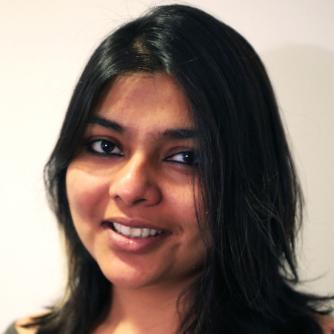
Poulomi Choudhury (she/her) is an Irish Research Council Scholar at University College Dublin’s School of English, Drama and Film. Her doctoral project, ‘Fleshy Food Resources of the Future,’ examines the role of animal agriculture and meat in the current and ongoing climate crisis through an analysis of twenty-first-century literary works.
Exploring Horrors of Class, Caste, and Alienation in Vandana Singh’s ‘Are you Sannata3159?’ (2018)
During the EARTH Scholarship, Poulomi will develop an ecocritical and postcolonial reading of meat eating and cannibalism in Vandana Singh’s short story Are you Sannata3159? within the context of India’s unique meat culture. Her chapter aims to critically analyse how the literature of postcolonial India represents animal agriculture (a leading cause of the current climate crisis) as an extractive, world-capitalist project which subsumes both humans and nonhumans, just as it relentlessly produces more labour and animal capital. She will be mentored by Dr Sourit Bhattacharya, a leading scholar in environmental and food studies in postcolonial literature, at the University of Edinburgh.
Salomé Dehaut | University of Aberdeen
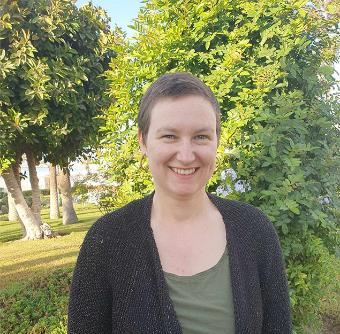
Salomé Dehaut (she/her) is a PhD candidate in Geography at the Urban Planning and Alpine Geography Institute at the University of Grenoble Alpes, France. She specialises in more-than-human and cultural geography. Her PhD thesis focuses on rewilding narratives, studying various initiatives in Europe with a focus on France and the UK.
Representations of Scotland in contemporary rewilding novels
During her EARTH Scholarship, Salomé will explore rewilding narratives found in literary fiction. She will be working within the School of Language, Literature, Music and Visual Culture at the University of Aberdeen under the mentorship of Professor Timothy Baker. Her focus will especially be on the depiction of Scottish landscapes and ecosystems in contemporary fiction dealing with rewilding. Conducting this analysis will allow her to explore the idea of ‘more-than-human narratives’, or ways of telling stories that do not centre around human beings.
Luke Kaplan | University of Strathclyde
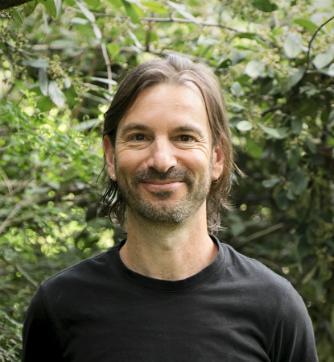
Luke Kaplan (he/him) is a PhD researcher and artist based at the Environmental Learning Research Centre, at Rhodes University in South Africa. His research and photographic work explores how creative practice and output can work towards transformation in social and environmental justice situations, and the role of imagination in fostering a sense of relationality.
Making home and coming home for climate refugees in Scotland
Luke's EARTH Scholarship project uses a creative methodology, exploring the status of climate refugees within Scotland. Working in the context of the recognition of growing numbers of climate refugees in the future due to environmental factors, the project will connect to various existing networks – social, legal, academic, and creative. Luke will be conducting his proposed research with Dr Saskia Vermeylen at the University of Strathclyde, where he will work collaboratively with photography, and an approach that connects art and law, exploring creative approaches to ideas of displacement and place-making, connecting this research to an expanding legal and political understanding and definition of climate refugees.
Emily MacCallum | University of Aberdeen
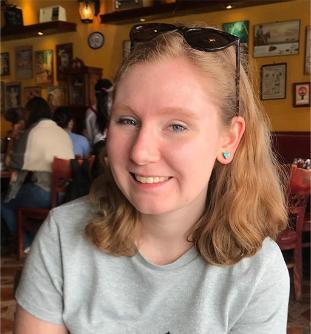
Emily MacCallum (she/her) is a PhD candidate in Musicology with a collaborative specialisation in Environmental Studies at the University of Toronto. Her doctoral research investigates how extraction and industrialism influenced music production and reception throughout the UK and more broadly how extractive industries influenced the cultural understanding of landscape. Over the years, Emily has also collaborated on many interdisciplinary sustainability projects and worked in academic event coordination. In 2020, Emily completed her MA in Musicology after completing a Bachelor of Music in 2017.
Music, Sound, and Landscape as British Cultural and Material Resource, c.1900-1927
During the EARTH Scholarship exchange, Emily will be based at the University of Aberdeen’s School of Language, Literature, Music and Visual Culture under the mentorship of Dr Jonathan Hicks where she will continue her PhD work. Emily’s thesis examines the relationships between early 20th century British orchestral and brass band music, and both the cultural and material conceptions of landscapes – particularly in the context of resource extraction across the UK. While in Scotland, Emily will continue writing about themes of urban landscapes and industrialism and pursue broader dissertation research about rurality, pastoralism, and material-resource history. She will also visit the National Library of Scotland and various mining and transportation museums.
Kamila Mamadnazarbekova | University of Glasgow
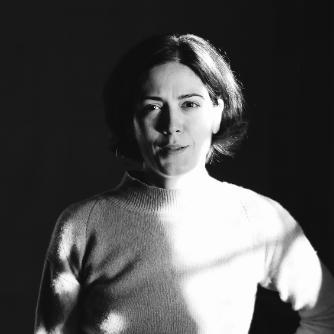
Kamila Mamadnazarbekova (she/her) is preparing her thesis on the role of landscape theatre and the concepts of nature in 21st century British theatre at the Sorbonne University under the supervision of Professor Elisabeth Angel-Perez and co-supervision of Dr Anna Street. Kamila graduated from the Moscow Theatre Academy. She also earned her Masters degree from Le Mans University, where she is part of Performing Water research platform.
Contemporary Landscape Performance in Scotland : Mapping, Aesthetics, Political Effects
During the EARTH Scholarship, Kamila will continue her PhD research and create an analytical survey of contemporary landscape performance in Scotland. She intends to gather substantive documentation, interview artists and researchers, and catalogue existing personal and institutional archives. Building upon traditional forms of Humanities research, Kamila will also study first-hand the lochs and glens, the Cairngorm mountains and the tributaries of the river Clyde. Relying on unique performative methodologies developed at the Department of Theatre Studies of the University of Glasgow, Kamila will historicise and contextualise contemporary Scottish landscape performance and trace its influence on British and continental scenes. She will be conducting her proposed research with Professor Carl Lavery.
Sindi-Leigh McBride | University of Edinburgh

Sindi-Leigh McBride (she/her) is a writer from Johannesburg and PhD candidate in African Studies at the University of Basel, Switzerland. Her PhD thesis (submitted December 2023) investigated the politics and poetics of climate change in South Africa and Nigeria through contemporary art and literature. Her arts criticism and short stories have appeared in numerous outlets, and she is a co-editor of Lost Libraries, Burnt Archives (2023).
Contemporary art and climate-related human displacement in Africa
At the University of Edinburgh, Edinburgh College of Art, Sindi-Leigh McBride will work on a book project based on her PhD research at the University of Basel, which investigated climate change in South Africa and Nigeria, through contemporary art and literature. Her book investigates how art can make us think about the climate crisis in Africa, taking as its premise the four main drivers of climate-related human displacement – flooding, extreme heat, drought, and fire – to explore how contemporary African and diasporic artists working across mediums offer insights into the causes, impacts and lived realities of climate change on the continent. Sindi-Leigh will be conducting her proposed research with Dr Lucy Steeds at Edinburgh College of Art.
Aphiwe Moshani | University of Strathclyde

Aphiwe Moshani (she/her) is a One Ocean Hub early career researcher and PhD candidate at the University of Cape Town, South Africa. Actively engaged in advocacy and ocean governance research initiatives, her research focuses on understanding ocean and coastal conflicts, particularly those arising in blue economies. Grounded in expertise in South African rural coastal communities, Aphiwe’s work is committed to promoting human rights and environmental justice in the African region.
Balancing the Tide: Safeguarding International Human Rights of Rural small-scale fisher women in South African ocean governance.
During the EARTH Scholarship exchange, Aphiwe will be based at the University of Strathclyde, investigating the challenges and opportunities in the protection of the human rights of rural coastal small-scale fishing communities in South Africa by exploring the recognition of cultural rights of indigenous small-scale fisher women. This research seeks to provide recommendations to emphasize the implementation of decision-making processes in the blue economy, which are inclusive of the cultures and experiences of small-scale coastal fisher women.
This proposal is separate but largely informed by their ongoing work as an early career researcher in the One Ocean Hub transdisciplinary research consortium and Ph.D. dissertation supervised by Assoc Professor Merle Sowman and Dr Philile Mbatha, prominent ocean governance and livelihood scholars based at the University of Cape Town, and is mentored by Professor of Global Environmental Law at the University of Strathclyde Law School and Director of the UKRI GCRF One Ocean Hub, Elisa Morgera.
Sidney Muhangi | University of Strathclyde
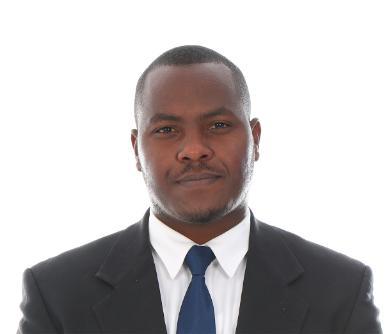
Originally from Uganda, Sidney Muhangi (he/him) is a scholar based at Rhodes University, South Africa. His PhD thesis (submitted December 2023) investigates agricultural extension skills planning and development for climate resilience in the Skills ecosystems of South Africa and Uganda in a cross-case comparative design. Sidney is currently in the early stages of his post-doctoral research with a British Academy-supported ‘The Times of a Just Transition’ project.
Reconceptualising agricultural extension skills system for a just and sustainable transition of smallholder farming in a changing climate
During the EARTH Scholarship exchange, Sidney will be based at the University of Strathclyde under the mentorship of Dr Maria Sledmere. Sidney will work with experts to advance research that will formulate tools for bolstering the Climate Resilience of agricultural advisors and smallholders in Eastern Cape, South Africa. The project addresses climate impacts on local agriculture. Using visual aids and storytelling, it will analyse regional, national, and local skills ecosystems and capture perspectives, practices and experiences of agricultural advisors and farmers regarding climate change. Subsequent research will develop an actionable tool that outlines optimal rainfall and cropping times, social learning materials, as well as a framework for developing resilience skills to facilitate just transitions for smallholder farming.
Laura Pannekoek | University of Glasgow
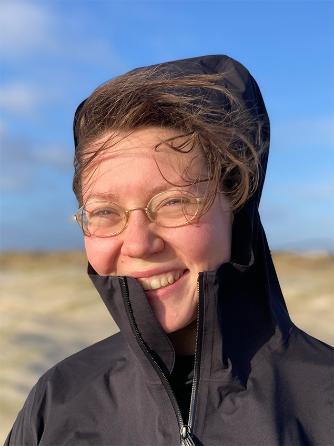
Laura Pannekoek (she/her) is a PhD Candidate in Communication at Concordia University in Montreal. Her dissertation project titled Settler Geology: Colonial Technologies of Subsurface Mediation tracks the historical convergence of geology and settler colonialism in Canada from the inception of the Geological Survey of Canada in 1842 and compares and contrasts this with contemporary geological practices for energy transition. She is interested in the role that geology plays (historically and in the present) in cultural conceptions of the earth and the social dynamics, climate politics, and environmental regulations that emerge from that.
Geocultures After Coal
Glasgow, like many places in the UK, sits on top of abandoned, flooded coal mine workings from the late 19th and early 20th century. The water in these mines could be used to heat homes in the city through geothermal energy. During the EARTH Scholarship exchange, Laura will be based at the University of Glasgow and will be studying the cultural, social, and political dimensions of a transition from coal mines to low-carbon geothermal energy. Who will own, operate, and maintain this new infrastructure? And what does it mean for our understanding of Glasgow’s energy past, present, and future? This project will be based at the newly established Infrastructure Humanities Group (IHG) at the University of Glasgow, directed by Dr Rhys Williams. This group, which also includes environmental humanities scholars Dr Alexandra Campbell and Dr Fred Carter, studies the social, ecological, and aesthetic dimensions of infrastructure, and is committed to developing research questions and methodologies across interdisciplinary and non-academic collaborators.
Nabanita Samanta | University of Edinburgh
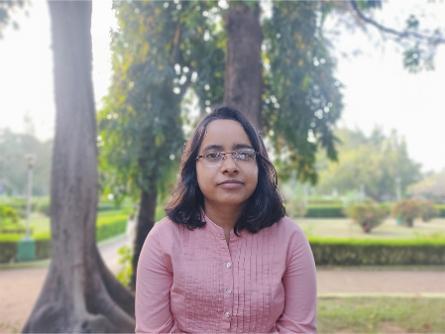
Nabanita Samanta (she/her) is a second-year doctoral researcher at the Department of Humanities and Social Sciences, Indian Institute of Technology Bombay (Mumbai, India). With a distinctive leaning for transdisciplinary research, she locates her research-interests at the intra-section of ecology, society, and the self (broadly conceived). Her research engagements span across the transdisciplinary fields of political ecology and ecological anthropology, critical ocean studies and blue humanities, anthropology of infrastructure, STS, and resistance studies. Her ongoing PhD project seeks to understand the processes of making and unmaking of coastal infrastructures, particularly maritime ports, against the backdrop of Anthropocenic poly-crises on one hand and the proliferating regime of ‘blue-growth’ on the other. More details on her academic profile can be found here.
Offshore Anthropocene, Archipelagic Affordances: Infrastructural promise, competing imaginaries, and hydrosocial futurities
As an incoming EARTH Scholar, Nabanita will be based at the University of Edinburgh under the mentorship of Dr Hannah Boast. She will be exploring the transgressive and generative potentialities of archipelagic thinking to bring into attention the possibilities and foreclosures that these approaches afford for grasping and reconfiguring Anthropocene futurities. Having the Nicobar Island as an entry-point of her inquiry and taking cognisance of how archipelagic geographies globally are turned into strategic fulcrum for speculative visions of ‘blue-growth’, Nabanita’s project will unravel figurations of more-than-human hydrosocial futures as opened up through heuristically engaging with archipelagic forms and imaginaries. Contesting the modernist framing of the world as coherent and stable hence controllable and manageable, thinking with archipelagos foregrounds alternative onto-epistemologies that draw upon mutability and multiplicity, relationality and entanglement, connections and assemblages. This endeavour will primarily be anchored in critical theoretical-inquiry, conceptual and methodological deliberations drawing on transdisciplinary environmental humanities, along with archival research and some comparative insights from the context of Scotland. This Earth Scholarship project is a part of Nabanita’s ongoing doctoral work which, based on multi-sited ethnography of different contested ports, delves into sociotechnical imaginaries, competing values, and figurations of futurities that contour and configure infrastructural promise of ports and concomitant contestations around the same.
Tilak Tewari | University of St Andrews
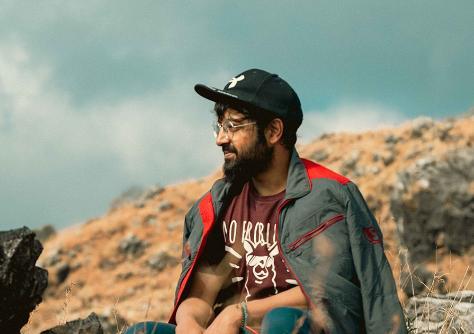
Tilak Tewari (he/him) is a PhD candidate based at Victoria University of Wellington, New Zealand. He studies hill stations in the British empire. Hill stations were high-altitude colonial resorts in South and Southeast Asia established by colonists in the nineteenth century to escape the heat and diseases prevalent in the low-lying tropical plains. Mountainous tracts of the Indian subcontinent were also arenas of scientific exploration and attracted colonial specialists interested in ideas of climate, health, sanitation as well as geology, cartography, and natural history. Critically evaluating the evolution and diffusion of scientific ideas in colonial mountain resorts, Tilak is interested in framing the evolution of these sites in terms of the technologies and environmental negotiations that shaped them.
From Highlands to Hill Stations: The Role of Scots in the Evolution of British Mountain Resorts (1820-1880)
During the EARTH Scholarship exchange, Tilak will be based at the University of St Andrews under the mentorship of Dr John Clark. He will examine first-hand accounts of British travellers in the foothills of the Himalaya and Nilgiris mountain ranges in the Indian subcontinent. Early accounts that captured the initial impressions of botanists, geographers, surveyors, and other colonial officials traversing and documenting newly acquired hilly tracts in the Indian subcontinent were characterised by a mix of aesthetic and scientific framing of the climate and environment. The encounter with high altitude landscapes led to comparisons with familiar landscapes from ‘home’ and the framing of bucolic scenes in temperate climate as ‘Scotland of the east,’ ‘Little England,’ or ‘Switzerland of India’ etc. and simultaneously led to the production of useful scientific knowledge about these regions. Tilak will examine this interplay of culture and environment in historical narratives to highlight the role of early Scottish (and Welsh) explorers such as James Baillie Fraser, Hugh Cleghorn, Francis Buchanan-Hamilton, Alexander Gerard, Constance Gordon-Cummings, Fanny Parks, Bishop Heber, John Leyden, and others in the development of the Himalayan and Nilgiri foothills.
Zaellotius Wilson | University of Strathclyde
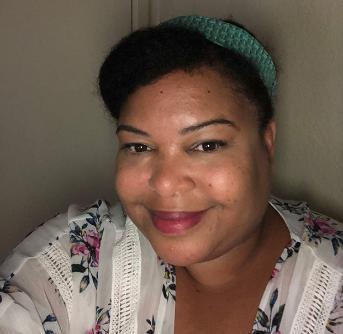
Zaellotius’ (she/her) PhD project at Arizona State University examines insects in various European late medieval and Early Modern art. The project explores the economic, social, and symbolic reasons for the inclusion of specific insects in art. Zaellotius is part of a father-daughter research team that focuses on African-Americans in Tucson, Arizona after the U.S. Civil War. She earned her master’s degree from Arizona State University under the guidance of Professor Corine Schleif. Zaellotius completed her undergraduate degree at Pitzer College. Her research interests include: northern Iberian medieval queenship, insects, critical animal studies, Brazilian modern and contemporary art, artists’ books.
The Alchemist’s Web
During the EARTH Scholarship exchange, Zaellotius will be based at the University of Strathclyde under the mentorship of Professor Erica Fudge. She will undertake research that will form part of a chapter within her thesis, looking to connect the work of early alchemists with the use of insecticides. Early alchemists used their knowledge of plants to sell toxic remedies to combat insect infestations. The goal of the project is to engage with current discourse about insecticides and habitat destruction while promoting insect driven research. Currently, there are few insect-scholars, so this project hopes to encourage humanities-based interest in insect scholarship. Zaellotius' project looks to add voices from the past to the conversation about the use of insecticides.
Scotland-based EARTH Scholars 2024

In April 2024, our international EARTH Scholarship recipients will come together alongside a group of Scotland-based scholars. Together, they will network and collaborate during an intensive 2-week cohort-building core leadership programme held in various locations around Scotland. This will be supported by a set of thematically and geographically oriented Clusters. Click '+' below to find out more.
Meet our Scotland-based scholars:
Ciara Bolton (she/her) | University of Edinburgh | Valuing The Yet-To-Be-Loved - The Conscientious Retrofitting of Post-War Mass Housing
Sarah Bresnahan (she/her) | University of Glasgow | Coded Lands: Anthropocentric Functions of Videogame Environments
Rebecca Cornwell (she/her) | University of the Highlands & Islands | Precious Persistence: The Ecological Legacy of Shetland Botanical Writing for our Modern Understanding and Experience of Rare Plants in the Face of Climate Change
Hannah Duffew (she/they) | University of Edinburgh | Accessing post growth futures: Introducing healthcare and assistive technology into the post growth imaginary through design and disability theory
Alex Gibbons (he/him) | University of the Highlands & Islands | A tradition at risk? Vernacular thatching in the Highlands and Islands and its shared heritage through the Inner & Irish Seas
Euan Healey (he/him) | University of Glasgow | Maritime Gaels: a Social History of Labour in West Highland and Hebridean Fishing Communities, 1790-1914
Ines Kirschner (she/her) | University of Aberdeen | Nature and wildlife conservation in twenty-first-century fiction
Gwenffrewi Morgan (she/they) | University of St Andrews | Historiography and the Hills: environmental thought and history-writing in western Britain during a long twelfth century (c.1070-1230)
Gala Morris (she/her) | University of Glasgow | Into the Wild: Archaeology, Rewilding, and the Historic Environment
Helena Fornells Nadal (she/her) | University of Glasgow | Poetry and Land Reform: A New Ecopoetics for Scotland
Wonah Odey (he/him) | University of Stirling | Greening the Future: AI Governance and Environmental Sustainability
Edda Starck (she/her) | University of Aberdeen | Landscapes of Music: The more-than-human lives and politics of musical instruments
Yimeng Xu (she/her) | University of Strathclyde | PhD Journalism, Media and Communication
